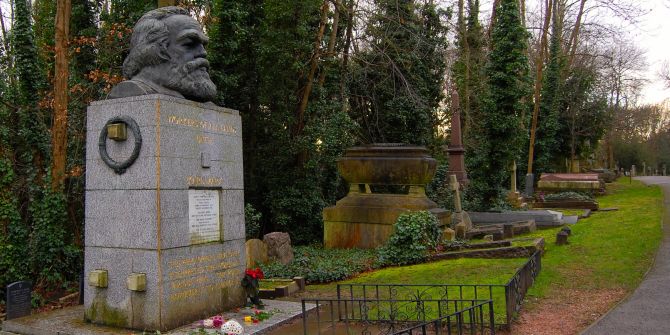If Karl Marx famously dismissed religion, why do some contemporary Marxists deem it to be compatible with socialism? Joseph Cronin suggests that Marx and today’s Marxists both treat religion with pragmatism. Marx saw religion as an understandable yet unhelpful response to societal inequality. Contemporary Marxists, however, note that marginalised groups tend to be more religiously observant. As society has changed, so too has the Marxist response.

In recent years it has become commonplace to hear Marxists assert that the widely held assumption that Marxism is opposed to religion is incorrect. This assumption is based, they claim, on a decontextualized and therefore misleading interpretation of the famous passage in the introduction to A Contribution to the Critique of Hegel’s Philosophy of Right (1844) in which Marx states that religion is the ‘opium of the people’. Read against the previous sentence – ‘Religion is the sigh of the oppressed creature, the feeling of a heartless world, and the soul of soulless conditions’ – the quote takes on a very different meaning. The ‘feeling of a heartless world’ suggests that religion provides refuge from capitalist oppression. Marxism may therefore be seen as compatible with religion.
So have we misunderstood Marx all along? His writings on religion are not simple or straightforward, but the present-day interpretation of Marx as sympathetic towards religion is, I believe, determined more by contemporary political circumstances than it is by a close reading of what he actually wrote. In short, to take ‘opium of the people’ as the sum total of Marx’s attitude towards religion is myopic, but adding the previous sentence adds only one extra layer of context. To get beyond that, one needs to ask why Marx said that religion is ‘the feeling of a heartless world’.
The Critique of Hegel’s Philosophy of Right, or at least the first few paragraphs which relate to the question of religion, is a difficult read, but it is not ambiguous (in fact you can read it here and decide for yourself). Marx argues that religion is the product of humans, or rather, the product of the societies humans create. Religion mirrors the inequalities of the society in which it exists, so the poor become the virtuous, the wealthy will find it difficult to enter heaven, etc. Religion is therefore a wish-fulfilment fantasy: it is how those who adhere to it would want society to look if only they had power. (Of course those who promoted religion in the nineteenth century were often those who wanted to maintain this inverted vision as a fantasy, in order to prevent the notion that it might become real in this world gaining traction.)
For Marx, the ultimate aim of the fight against religion is not religion itself, but rather the type of society which causes the suffering which creates the need for religion in the first place. Religion is therefore an understandable but misguided response to the suffering caused by exploitation in feudal and capitalist societies. To engage with the metaphor directly: if you are under the influence of opium then you are detached from reality. And you take opium precisely for this reason – because you don’t want to face reality. Because you are in pain, or because your circumstances have become impossible to deal with any other way. Religion, as a kind of spiritual opium, prevents people from realising that their suffering is not the ‘natural’ state of affairs that will be rectified after death, but a material situation that can be changed in this life. To achieve this realisation, however, people first need to throw off religion because its very purpose is to make them accept their subjugation by preventing them from understanding their true situation.
A caveat to this is that Marx is clearly writing about Christianity here – he criticised Judaism too in On the Jewish Question (1844), but from a different standpoint – and he doesn’t account much for other world religions elsewhere in his work. This may be significant, especially considering how European societies have changed since Marx’s time in terms of religious composition. But this is not a thread that many contemporary Marxists seem to pick up on, besides asserting that minority religions can be harnessed as agents of revolutionary struggle. That may well be the case, but does this mean that those religions are not illusions, or rather that they are still illusions, albeit with a different relationship to the society in which they exist?
It is not my intention to ‘prove’ that Marx was anti-religion and that Marxism today should therefore take that position. Firstly because Marx’s attitude towards religion does not need to be accepted as holy writ by today’s Marxists. Marx himself never intended this. He believed that socialism should adapt to changing circumstances and find new ideas and responses in order to remain relevant. This leads to a second point. There are understandable reasons why Marxist activists today might wish to proclaim that Marxism is not against religion. The most economically marginalised groups, certainly in the UK but also across the globe, tend to have higher levels of religious observance. Why then would you want to alienate a potentially huge and receptive audience by telling them that their faith is an ‘opium’?
There is no problem with telling people that today’s Marxism is not opposed to religion. The problem arises when you tell someone that Marxism has never been opposed to religion, or that Marx was a supporter of religion. That is an interpretation of Marxism detached from its history. And in any case it is not necessary, since there is no reason why the writings of Marx and contemporary Marxist thought need to be in perfect accord.
As a final thought – and at the risk of undermining the point that Marxism can be separated from its founder – it’s hard to resist imagining what Marx himself would think if he were told that, nearly 140 years after his death, the political ideology he inspired, and indeed his own writings, were being reconceptualised to make space for religious belief. One imagines he would get the sense that things had not gone entirely to plan.
Note: This piece gives the views of the author, and not the position of the LSE Religion and Global Society blog, nor of the London School of Economics.






Your understanding of Marx views on religion opened my mind.
Great article about karl marx very informative thanks for sharing
You have really deep knowledge about karl marx..thanks for sharing it.